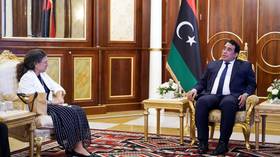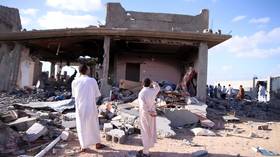UN hosts talks on Libyan central bank crisis

The UN Support Mission in Libya (UNSMIL) has held talks in Tripoli to resolve a standoff between the North African nation’s rival governments over the appointment of a central bank governor.
According to UNSMIL, meetings involving representatives from the House of Representatives (HoR), the Supreme Council, and the Presidential Council took place separately on Monday.
“Participants made significant understandings on ways to resolve the crisis surrounding the central bank, and restored the confidence of Libyans and international partners in this vital institution,” the mission said in a statement.
The African country has been split between two competing administrations since a NATO-backed uprising in 2011 toppled longtime ruler Muammar Gaddafi. The interim Government of National Unity, which was installed as part of a UN-backed process to prepare for elections, is headquartered in Tripoli – the western part of Libya – and the capital. The other administration is based in Benghazi in the east, home to the national parliament, the HoR.
Last month, the eastern administration shut down all oil production and exports in protest at the ouster of the governor of the Central Bank of Libya (CBL), Sadiq al-Kabir, by the rival Western faction.
The Presidential Council, which is affiliated with the Tripoli-based government, issued a decree removing Kabir – who had led the CBL since the country descended into chaos in 2011 – and replacing him with former deputy governor Mohamed Abdul Salam al-Shukri.
Aguila Saleh, speaker of Benghazi’s parliament, and the Libyan National Army (LNA), led by Khalifa Haftar, condemned the Presidency Council’s “unilateral” decision as “unacceptable.”
The central bank is the only internationally recognized repository for the African country’s oil revenues and foreign reserves, as well as for paying state salaries.
Last week, the UN Security Council urged the factions to avoid unilateral measures that could escalate tensions and undermine Libya’s fragile stability. The council advised opposing parties to reach a peaceful resolution to the central bank crisis.
Following Monday’s talks in Tripoli, which lasted late into the night, UNSMIL announced that the rival governments had agreed to submit a draft agreement to their respective chambers for review. According to the UNSMIL statement, the consultations will conclude on Tuesday with the aim of finalizing the agreement.













